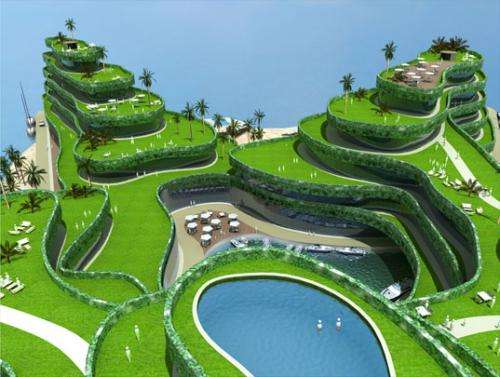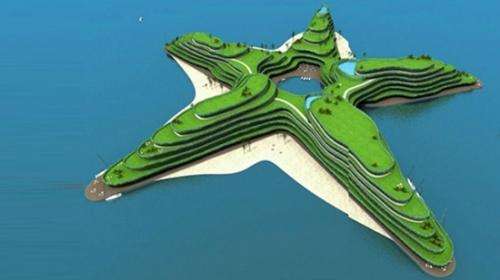August 12, 2012 weblog
Maldives floating island masterplan tests the waters

(Phys.org) -- From tourist paradise to devastation to sustainable future, an imaginative path toward rebirth is possible for global coastal populations at risk of being wiped out by rising sea levels. That path lies in artificial floating islands. The Maldives government is in a joint venture with the architectural firm Dutch Docklands International for the world’s largest artificial floating-island project. The present phase will focus on tourism. In turn super-rich globetrotters will enjoy the high end living activities they are accustomed to without having to fear being suddenly wrapped around a pole and dying.
Dutch designers from Waterstudio as part of the collab will construct a network of floating islands for luxury residences, hotels, convention center, yacht club and a floating golf course. For the number of 400,000 Maldives residents, a next-phase plan is to build islands for affordable housing. “Islands” are in the plural because the Maldives is an island nation in the Indian Ocean, made up of a chain of islands. These are 1,190 coral islands that are formed around 26 atolls, spread over 90,000 square kilometers. Sea level has risen since 1900. Scientists predict that the rising sea levels in the future, if ignored, could bring calamity and push the population out of their homes.
The Maldives government, aware of the problem, first started thinking of alternative plans in 2008, when they began to take annual tourist revenue and place it in a fund to buy what may have been new homelands, possibly in Australia, India, or Sri Lanka. Now, however, they are turning to another solution in a partnership with the Dutch Docklands company. The floating islands that they envision will rise with the sea. Instead of fighting against the sea, they will coexist. The joint venture masterplan involves over 800 hectares/ 80 million sq.ft of water with floating developments. Dutch firm Waterstudio are project designers and Dutch Docklands are the floating architecture specialists engineering the project.

The 18-hole golf course is one of the projects being given lots of international exposure, each with two to three holes, connected by underwater tunnels. The golf course is a $500 million project, paid for by the Maldives government and private investors. Forbes has referred to it as “the floating golf mecca.”
Architects today are convinced that architects of the future will want to learn more about working with water instead of against it. In the past, engineers have used sand and rubble to create islands, but these structures disturb the sea and seafloor ecosystems.
Building-materials that the Dutch put to use include slabs of concrete and polystyrene foam. Their design concept involves foundations for buildings transformed into floats. They use a foam core encased in concrete, with steel cables securing it against the pull of potential currents. No matter how high the sea levels, the structures will remain above water. The foam core encased in concrete with steel cables all serve to prevent a structure from floating away.
The Dutch company prides itself as using techniques that are environmentally friendly, or what they call “scarless” development. The design disturbs only a small patch of the seafloor, while preserving natural currents. Less space is disrupted on the sea floor with their design than if they were building with rock or sand.
With sea levels rising all over the globe, scientists say it is possible that the Maldives venture could be a roadmap for future developing nations at risk. The success of this project is not yet proven but floating-architecture supporters believe it is a better concept to pursue than disbanding populations and sending them elsewhere.
More information: www.dutchdocklands.com/maldives
© 2012 Phys.org


















